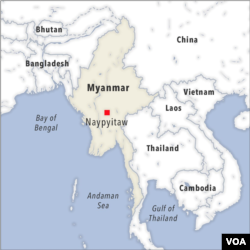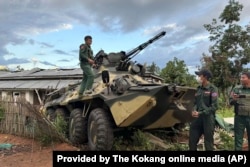As Myanmar’s military government prepares for elections in 2025, attention turns to neighboring China, which, critics say, is pressuring Southeast Asian nations to treat the vote as a solution to Myanmar’s ongoing political crisis.
A military coup in Myanmar in February 2021 overthrew the democratically elected government and triggered a civil war that left thousands of people dead and millions displaced. Myanmar’s neighbors have been seeking a solution to the crisis and recently held meetings in Bangkok, Thailand, to discuss it.
China was a participant at a Dec. 19 meeting that included Bangladesh, India, Laos and Thailand. All five countries are neighbors of Myanmar.
At the meeting, Chinese Vice Foreign Minister Sun Weidong urged the neighbors’ representatives to support Myanmar’s “peace and reconciliation,” according to a statement by China’s Foreign Ministry.
“All parties should respect Myanmar’s national conditions and … prioritize people’s livelihoods,” Sun said.
At the Dec. 19 meeting, Than Swe, Myanmar’s deputy prime minister and foreign minister, outlined the junta’s 2025 election roadmap. Opposition groups, including ethnic armed forces and the National Unity Government, or NUG, a parallel government formed after the 2021 coup, rejected the plan, questioning its legitimacy and whether the elections would be free and fair.
On Dec. 20, there was a meeting of all representatives of ASEAN countries, except Myanmar because junta political appointees usually have been barred from attending high-level meetings of the bloc since the coup.
Thai Foreign Ministry official Bolbongse Vangphaen said the bloc still awaits details of the proposed ballot, which China backs.
Myanmar’s military leadership did not respond to VOA’s request for comment regarding the Bangkok meetings, controversies surrounding its proposed elections or its preparations for the polls.
China maintains close ties with Myanmar’s military and the rebel groups near its border.
In his recent Christmas and New Year’s messages, Myanmar’s junta leader, Min Aung Hlaing, reiterated and reaffirmed the government’s commitment to “strengthening the multiparty democratic system and returning to the correct democratic path.”
VOA asked the Chinese Embassy in Myanmar for comment on China’s support for the election in Myanmar but has not received a response. However, during a visit to Myanmar’s capital, Naypyidaw, in mid-August by Chinese Foreign Minister Wang Yi, Beijing called for an “all-inclusive election,” according to the state-run Global New Light of Myanmar newspaper.
Skeptics argue that any election carried out by the junta would lead only to a superficial peace that ignores decadeslong political and ethnic grievances.
China’s growing sway
Experts told VOA that Beijing is urging ASEAN members to deepen their engagement with Myanmar’s military.
According to Jason Tower of the United States Institute of Peace, China is pressuring its Southeast Asian neighbors to accept the junta’s election as a quick solution.
“From China’s vantage point, if ASEAN is bringing the regime back in and is having higher-level interactions, it legitimizes what China is doing,” Tower said.
Myanmar expert Htet Min Lwin of York University in Canada said Beijing prefers leveraging its influence over that of Western intervention.
“If the resolution goes through ASEAN, where China holds considerable influence, Beijing will likely keep pushing an ASEAN-led path,” he told VOA.
Sai Kyi Zin Soe, a regionally based Myanmar political analyst, agreed.
“Some ASEAN member countries will not be able to overcome China’s influence, economically or in terms of security,” he said. “China’s power doesn’t stop at ASEAN; it also extends to domestic groups, including ethnic armed groups in Myanmar, which are now controlling almost all the border areas with China and are traditionally closely tied to China.
Tower, meanwhile, sees “no viable plan” for a political solution and said Beijing views Myanmar’s generals as “completely cornered” and open to “significant concessions” that could jeopardize sovereignty, including allowing Chinese troops to protect investments.
“China has been strong-arming two of the northern ethnic armed organizations into talks with the regime,” Tower said. “Chinese influence continues to rise, and [Beijing] is exerting that influence on other countries in the region, trying to get those countries to follow along.”
He warned the junta “is bankrupt when it comes to a real solution,” instead relying on “airstrikes, forced conscription and a sham election to legitimize junta leader Min Aung Hlaing.”
Tower predicted ASEAN would eventually realize the military’s steady decline.
Mounting battlefield losses
The junta’s China-backed electoral push comes amid a series of defeats.
“The military is losing ground at an alarming pace and is desperate,” Tower said.
Tower believes that after the fall of two major regional commands, Myanmar’s weakened military has no alternative but to trade away parts of its sovereignty to China.
“It’s making major concessions,” he said, citing China’s proposed joint venture security company. “For China, this turns Myanmar into a testing ground for its Global Security Initiative and new approaches to secure interests beyond its borders.”
In October, the Myanmar National Democratic Alliance Army, or the Kokang group, part of the Three Brotherhood Alliance along with the Ta’ang National Liberation Army and the Arakan Army, captured the city of Lashio in northern Shan State.
Lashio is considered strategic for the China-Myanmar Economic Corridor, marking the first time in modern Myanmar history that a regional command fell to rebels.
On Dec. 20, the Arakan Army seized the junta’s western regional command in Rakhine state, an area rich in natural gas that includes major Chinese projects. Video on social media shows emaciated junta troops surrendering. Tower said it was an “embarrassment of an army.”
“The bottom line is increasing desperation,” Tower said, adding that this explains why Myanmar’s military is ceding sovereignty to China, including the potential deployment of Chinese private security troops in Rakhine state.
Concerns of ‘negative peace’
Analysts say an election without real dialogue will yield a fragile ceasefire.
“All the neighboring countries, including China, cannot understand that each ethnic group in Myanmar has its own right to rule and sovereignty,” Htet Min Lwin said.
Sai Kyi Zin Soe noted, citing World Bank and United Nations data, that 42 million of Myanmar’s 53 million people now live in poverty.
He said the humanitarian crisis could push many armed groups to pause fighting but not necessarily resolve the conflict.
“If the international community pushes them, the war may stop, and the election will happen,” Sai Kyi Zin Soe said. “However, it will not be a solution that benefits Myanmar in the long term. It needs to be understood that only negative peace will prevail.”
Tower told VOA there may be opportunities this year for ASEAN to expand its role, but China’s involvement, especially in border areas, could overshadow that.
“If other countries don’t take careful note of Chinese interference,” he said, “the response in Myanmar tilts more toward where Beijing is headed.”




